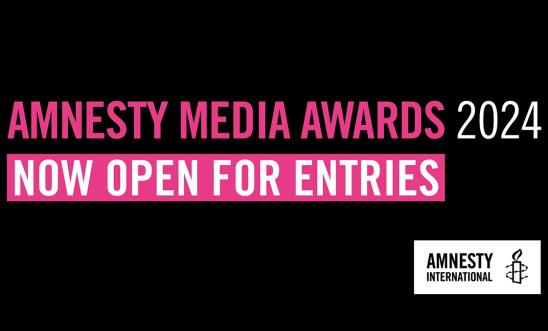
Press releases
Amnesty Media Awards 2024: judges announced

First wave of judges announced for Amnesty UK’s annual Media Awards
Closing date for entries is Monday 29 January 2024
Enter the awards: https://amnesty-media-awards.org.uk/
Amnesty International UK has announced the first round of judges for its 32nd annual Media Awards, with the ceremony host and full line up of judges set to be announced in January.
The prestigious set of awards recognise the vital role journalists play and the serious risks they face in highlighting human rights abuses around the world and holding power to account.
Confirmed judges include Julie Etchingham (ITV News), Christina Lamb (The Sunday Times), Maya Oppenheim (The Independent), Mark Austin (Sky News), Ayshah Tull (Channel 4), John Ray (ITV) and Alison Phillips (Daily Mirror).
The closing date for entries is Monday 29 January 2024, with the awards ceremony taking place at Amnesty UK’s Human Rights Action Centre in London on Thursday 9 May 2024.
Entries must be from a media outlet based in the UK and published or broadcast for the first time in the UK between 1 January and 31 December 2023 and can be submitted at: https://amnesty-media-awards.org.uk/
A list of previous winners can be found here. A list of the categories and confirmed judges can be found below.
Full list of confirmed judges
Mark Austin (Sky News); James Besanvalle (Metro); Suzanne Breen (Belfast Telegraph); Anoosh Chakelian (New Statesman); Liz Cookman (freelance); Karen Dalziel (BBC); David Dick (Daily Record); Maz Ebtehaj (The Guardian); Julie Etchingham (ITV); Megan Gibson (New Statesman); Ghoncheh Habibiazad (BBC); Sam Joiner (Financial Times); Sirin Kale (The Guardian); Christina Lamb (The Sunday Times); Sarah Lester (Manchester Evening News); Olga Loginova (freelance); Nevine Mabro (Channel 4); Christina Marker (Sky News); Jennifer McKiernan (BBC); Lydia McMullan (The Guardian); Mads Nissen (freelance); Maya Oppenheim (The Independent); Joe Pickover (PA Media); Alison Phillips (Daily Mirror); Catherine Philp (The Times); Tom Rado; John Ray (ITV); Joanna Ruck (The Guardian); Sara Rumens (The Times); Sana Safi (BBC); Anna Silverman (Grazia); Lindsay Taylor; Claire Thomas (freelance); Anca Toader (BBC) and Ayshah Tull (Channel 4).
Categories
Written News: A single written-word, short-form news report on a current and/or breaking story relating to a human rights issue. This can be print, online or multimedia.
Broadcast News (TV): A single film news report on a current and/or breaking story relating to a human rights issue. This can be TV or online. The entry should be no longer than 15 minutes.
Written Features: A written-word long-form newspaper, magazine, online or multimedia piece that creatively explores human rights issues.
Broadcast Features (TV): A TV broadcast news report or documentary that observes or reports on human rights issues. The entry should be between 15 and 60 minutes long.
Radio & Podcasts: This can be either excerpts from a series, a full-length radio documentary or podcast, a news report or compilations from a magazine programme which observe and report on human rights issues. The whole entry (including compilations) should be between 15 – 60 minutes duration. These must have been broadcast or available online.
Digital Creativity: Innovative or interactive presentations of human rights issues to creatively uncover or engage people in a human rights story or issue. Entrants must have been published for the first time or have had substantial fresh content published during 2023.
Photojournalism: A single photograph or a series of up to 12 photographs covering a human rights issue. These must have been published by a UK media outlet (newspaper, magazine or online). Only the entered piece will be judged, but overall impact will be considered if published elsewhere in the UK and submitted as supporting material. This category is free to enter.
Nations & Regions: This category is open to any UK regional media outlet and can be print, online or broadcast. Entries may cover global or regional human rights issues. This category is free to enter.
The Gaby Rado Award for New Journalist: This category is open to journalists who have been working for five years or less in paid employment as a journalist. Journalists should enter one piece in either broadcast, print, radio or online. This award was established with the help of the family, friends, and colleagues of the journalist Gaby Rado, who died in Iraq in 2003. Finalists will be asked for evidence of their eligibility. This category is free to enter.
Outstanding Impact Award: This is a judges’ choice category, chosen across all shortlisted entries. The winner will have demonstrated impact in addressing human rights issues and shown commitment and excellence in reporting.
Entries and fees
For more information on how to enter, the entry criteria and fees, visit: https://amnesty-media-awards.org.uk/
To encourage a wide range of entries, we have established a sponsorship fund to support a limited number of entries from freelance journalists and filmmakers, as well as small digital and broadcast outlets. See the website for more details.
Entries to Regional Media, Photojournalism and Gaby Rado categories are free.